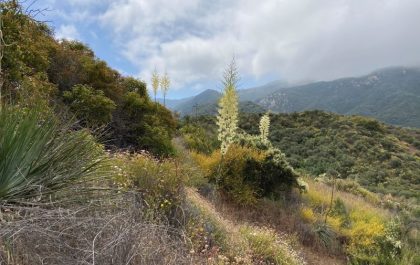The California legislative session came to a close on September 1 in a frenzy of activity. The dust is still settling, but Governor Gavin Newsom is already busy signing some of this session’s bills into law. It’s serious work—there are dozens of bills, and some major climate change laws have made it to the governor’s desk, including phasing out oil and gas drilling in or near homes, and new short-term targets for clean energy.
Senate Bill 1137 is aimed at cleaning up the South Coast’s long and messy oil history. It prohibits new oil and gas wells and major retrofits of existing operations that are within 3,200 feet of housing, schools, or medical facilities. Current lease holders would be required to monitor and clean up existing wells in that zone. In Los Angeles County alone, that would include thousands of wells, like the infamous one located on the campus of Beverly Hills High School.
AB 1757 and SB 905 both address carbon sequestering. AB 1757 takes an organic approach, including planting trees, adding landscaping in public places, and restoring wetlands.
SB 905 gives the California Air Resources Board the authority to develop programs and regulations for capturing and storing carbon, with a focus on oil refineries and big agriculture.
There are several new plastic recycling and waste reduction bills awaiting review, including a ban on single use propane cans, and new requirements for so-called ‘clamshell’ packaging. Produce bags are also being targeted. They will need to be either recyclable, reusable, or compostable.
AB 351 also addresses recycling and carbon sequestration. This bill facilitates human composting, by creating licensing and regulation processes for the process. The state’s public health department would regulate “reduction chambers” where the composting would take place. The goal is to provide a more environmentally friendly option to cremation or burial.
Newsom will be reviewing a host of health related bills, from provisions to protect abortion rights and fund abortion services, to privacy and safety protections for transgender youth, to a bill that would make it easier for the Medical Board of California to punish medical professionals who spread misinformation about public health issues, specifically COVID-19.
SB 1338 attempts to tackle chronic homelessness and mental illness through the court system. It would require every county to implement a court program that could compel people with serious mental illness to receive treatment by creating court ordered conservatorship. The goal is to provide a tool to help unhoused people who are experiencing mental illness and are unable or unwilling to stay in treatment.
SB 971 could be good for mental health as well. It makes it easier for recipients of public housing to have a companion animal.
AB 257, the Fast Food Accountability and Standards Recovery Act, authored by Assemblymember Chris Holden (D-Pasadena), has already been signed into law and is grabbing headlines nationwide. It authorizes the creation of a “Fast Food Council comprised of representatives from labor and management to set minimum standards for workers in the industry, including for wages, conditions related to health and safety, security in the workplace, the right to take time off from work for protected purposes and protection from discrimination and harassment.” Under the new law, the council could potentially raise the minimum wage for fast food workers to as much as $22 an hour. Currently, the California minimum wage for employers with more than 26 workers is $15 an hour. The new standards apply to chains with at least 100 locations nationally.
SB 846 is also controversial. It would keep the Diablo Canyon nuclear power plant on the Central Coast running until 2030 and give Pacific Gas & Electric $1.4 billion to keep the plant in operation. After years of ferocious debate between conservationists, PG&E, and government agencies, the troubled plant was scheduled to be fully decommissioned in 2025.
On a less apocalyptic note, AB 2799 would require prosecutors who want to use “creative expressions” as evidence of a crime to hold a pretrial hearing away from the jury to prove that rap lyrics or other artistic expressions are relevant to the case. It was a rare bill that made it through both houses without opposition.
Newsom has until September 30 to sign or veto all of the new legislation.












